#nemo ramjet
Explore tagged Tumblr posts
Text
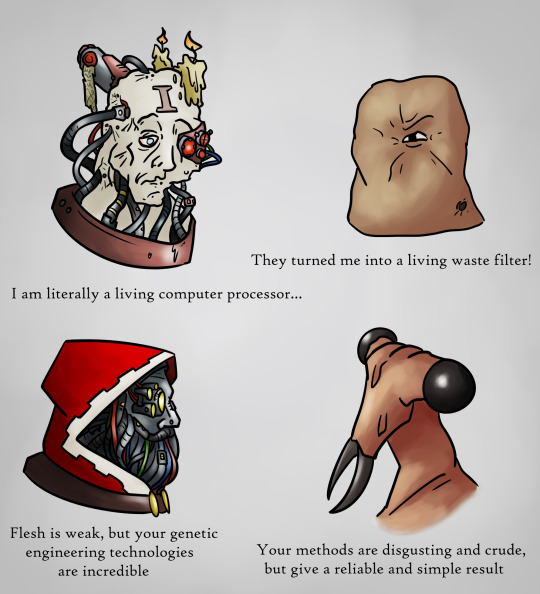
I think both of them would have something to talk about
#all tomorrows#posthuman#speculative biology#nemo ramjet#digital fanart#digital#digital art#fanart#art#warhammer 40000#wh 40k#40k#meme#qu#adeptus mechanicus#colonials
705 notes
·
View notes
Text
All Tomorrows is the perfect mix between the indomitable human spirit and eldritch horror.
humanity climbs into the stars, discovering new wonders and creating a galactic utopia... only to be wiped out by an unstoppable and sadistic alien threat.
but then, from the most pathetic scraps of what was left behind - new human species formed, with all the same beauty and wonder and curiosity and hope within them.
...until, again, they were wiped out. and this time they were contorted into even more abhorrent and aberrant forms.
but this time, the murderers of mankind would not go unpunished. a galaxy rending, multi-million year long war would spell the end of the mechanical tyrants.
and then, by a miracle of incalculable magnitude (that is barely even touched on by the book) humanity comes back once again. they somehow regained sentience and civilisation, they did the impossible again.
they even managed to redeem some of the machines. they are human too, after all.
in the end, mankind went extinct.
but it doesn't really matter. because there was somebody left to continue our legacy.
#space#all tomorrows#nemo ramjet#humanity#optimism#pessimism#the indomitable human spirit#eldrich horror
118 notes
·
View notes
Text
New Machine.
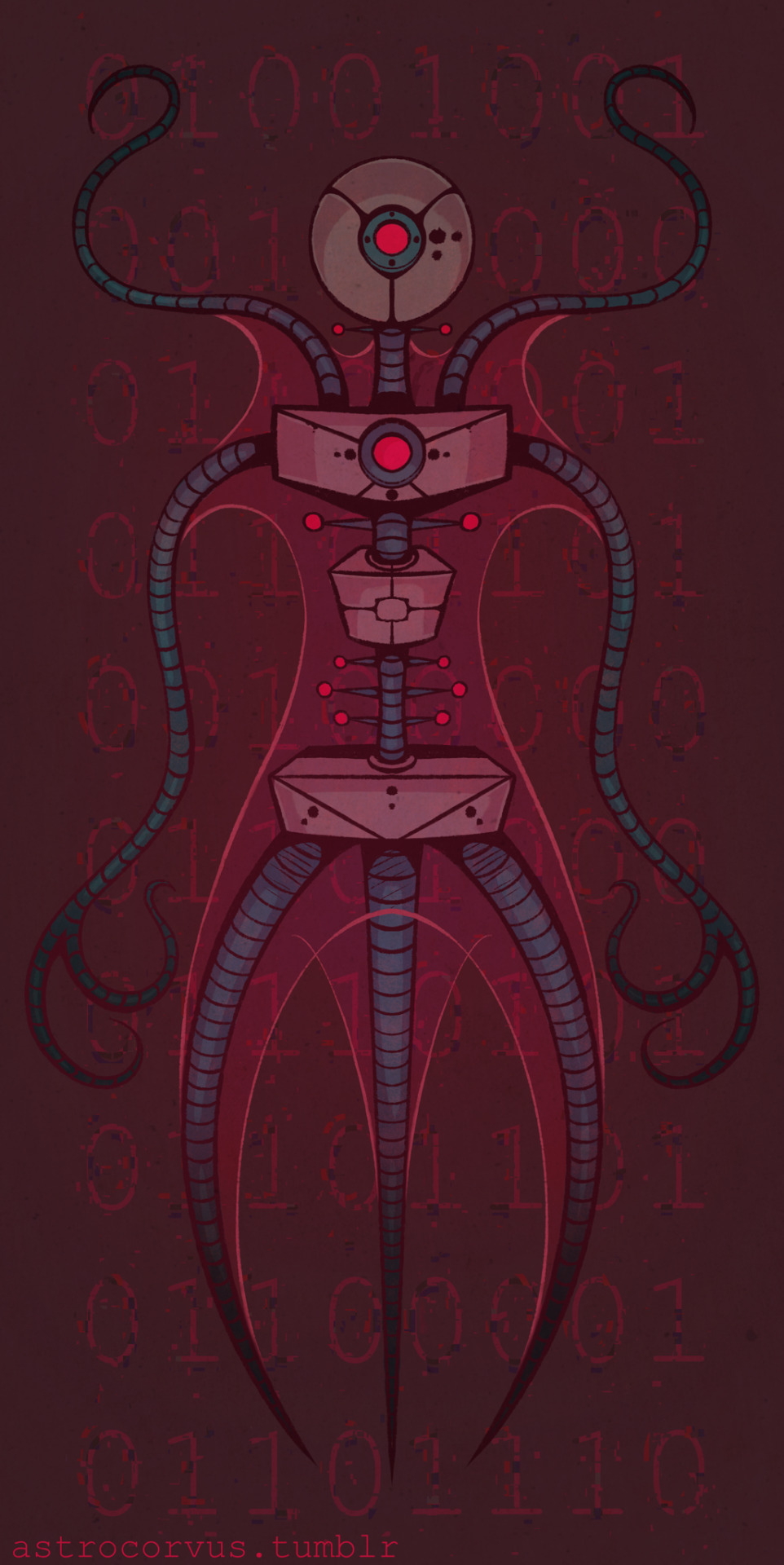
#my artwork#art#sci fi#character design#spec evo#all tomorrows#digital art#cm kosemen#nemo ramjet#new machine#science fiction#robot#spec bio#illustration#posthuman
225 notes
·
View notes
Text
All Tomorrow’s: Vanga Vangog’s Processor and Asteromorph’s HC’s

The grand finale of this saga of Vanga’s posthumans, and this one is on one of the saddest stories among the posthumans, the Mantelopes! In canon they had been born in bodies that made them unable to meaningfully interact in the world inspite of their sapience, and this would disappear quickly in a few thousand years as their songs of sorrow turn into regular mating songs and bellows.
Of course, that had not happen in Vanga’s timeline. Instead, the Asteromorph’s took interests on these posthumans due to the realization of their high intellect. This process, at first merely one of master and servant, would become a symbiotic one for both parties, with the Processors acting as the Asteromorph’s brains and memory-keepers, and the Asteromorphs the Processors hands and (Relative) brawn.
You can do a surprising amount with just a brain, and the Processor’s are the penultimate conclusion of that question, their relationship with the Asteromorphs making their empire far more technologically advanced and powerful than in canon, ironic considering the Asteromorph’s themselves wouldn’t become bigger brained.
-Their curious minds and natures made Processor’s extremely excited and interested on learning new ideas and things, to the point that they and the Asteromorph’s would make earlier contact with the Second Empire in this timeline, learning about all of their cultures and sharing some of their technology and ideas. This also had the benefit of stopping the Gravital’s from killing everyone.
-They kept their ancestral traditions of singing songs, their laryx (Voice box) being the only thing other than their brain to grow in size. Only instead of singing exclusively sorrowful songs, they instead sung songs of hope, rage, and so many other different emotions, including those only they can feel. Their laryx were so developed that they could mimic a ton of different sounds we couldn’t, including metal guitars, chainsaws, plane jet engines, and stuff that is beyond our hearing range.
-Most Processors are born offworld in the zero-gravity habitats of their Asteromorph Symbiotes, though there is still a very sizable trillions of them living in their home-Star system. This birthplace is effectively their version of Mecca, as almost every Processor visits once to several times during their lifetime. (With help from Asteromorph’s of course.)
-The Asteromorph’s are much less reclusive than in canon, and in fact a sizable amount of the population are now living in space habitats or even low-gravity worlds of other posthuman species. The highest populations of them live alongside the Modular People, Stickmen, Pterosapien’s, and the Satyriac’s .(Even they need to cut loose and party!)
-The Asteromorph’s knowledge of their ancient history, alongside the Processor’s general intelligence and assistance from the Second Empire, allowed them to find their ancestral homeworld earth far earlier. No one would inhabit the planet however, instead deciding to seed the almost deserted planet with new life from each of their worlds and millions of years later, when the sun threatens to blow up, they safely move earth into a new star system, allowing the introduced, establish and possibly sapient life to flourish.
-The Asteromorph’s and Processor’s of later times treat eachother like friends or even siblings, with an eachother being paired so long as they get along very well.
-After reaching connecting eachother’s consciousness’s, the Processor’s would offer their Asteromorph and other posthuman brethren the ability to do so as well, with them being able to agree or decline however they see fit.
-Once finding the Qu, this Posthuman empire would not horrifically mutate or kill every last one of them, instead deciding to strip them of all of their biotechnology, take down their leadership, and having them live alongside as equals….. the posthuman’s unwilling to stoop down to their abusers level.
-Like in canon, they would all disappear from this galaxy, but instead of it being a relatively ambiguous fate, the Author’s species would discover what had truly happened to humanity……… in that they had reached apotheosis and have left this universe altogether, instead deciding to seed new universe and life, so that they may love today, and seize all tomorrows.
#all tomorrows#all tomorrows mantelope#mantelope#processor#cm kosemen#nemo ramjet#headcanons#worldbuilding
200 notes
·
View notes
Text

"Even now, it is sickeningly easy for beings to get lost in false grand narratives, living out completely driven lives in pursuit of non-existent codes, ideals, climaxes and golden ages. In blindly thinking that their stories serve absolute ends, such creatures almost always end up harming themselves, if not those around them.
To those like the misguided; look at the story of Man, and come to your senses! It is not the destination, but the trip that matters. What you do today influences tomorrow, not the other way around. Love Today, and seize All Tomorrows!"
All Tomorrows by Nemo Ramjet
3 notes
·
View notes
Text
All Tomorrows: The Myriad Species and Mixed Fortunes of Man by Nemo Ramjet
Genre: Science Fiction
Pages: 111
Publication date: 2006
All Tomorrows follows the future evolution of humans after an intelligent alien race, the Qu, genetically modifies humans and leaves them on other planets across the galaxy. Some of these new human evolutions have better luck than others.
I really loved this book and my only complaint was that it was so short it left me wanting more. There isn't much to say about it other than it was really, really interesting. It was well written and the drawings added so much great context to the way things were described and the things that I was reading.
There were some human evolutions whose entire life was nothing but suffering, and there were other's whose entire life was nothing but hedonistic pleasure. There were so many different things that were explored in terms of how hostile planets might change the way that things evolve and it was all done really well.
5/5 stars
Finished reading December 15, 2023
2 notes
·
View notes
Text
cool things
#nemo ramjet#i took all these links from a reddit post i just wanted to post them here to come back to
0 notes
Text
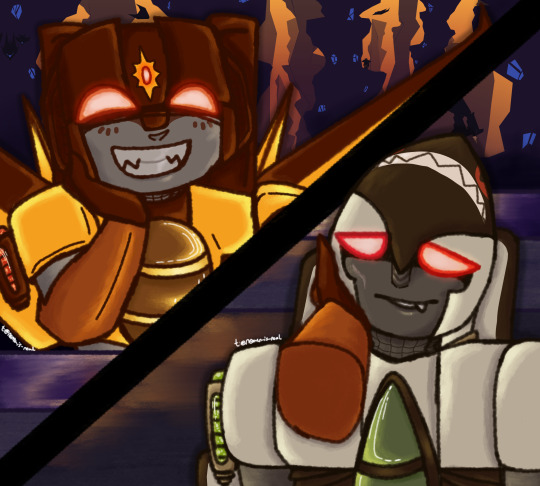
rare nemo art post
AUURRGHHHH THEMMM!!! MY BOYS!!!! i love them sm <3
#ramstorm#ramjet#sunstorm#transformers#maccadam#maccadams#rarepair#transformers seekers#nemo art!#digital art#also a little bit of a valentines gift to my bf#were matching elsewhere teehee <3 i love him sm
38 notes
·
View notes
Text
Title: All Tomorrows
Author: Nemo Ramjet
Genre: Science Fiction
Pages: 111
First published: 2008
Recommended by: Tik Tok
Started: 5/13/24
Finished: 5/17/24
Overall Rating: 4/5
Setting: 5/5
Readability: 5/5
Okay where to even begin on this book (?). Firstly it’s available for free on the author’s website, so it’s very accessible. Do with that info as you will.
So the book is a story on the fictional future of the world. At points it gets dark, there’s moments of hope. Over all there’s a lot of dope art. If you’re into body horror, weird mutations, and all around a weird time this book is definitely a must read.
4 notes
·
View notes
Text
just finished reading All Tomorrows by Nemo Ramjet
so if somebody from Amnesia fandom have read this book
watcha think about Zerzurians being some kind of local analogue of The Qu in Amnesia (multi)universe?
#amnesia#amnesia tdd#amnesia the dark descent#amnesia rebirth#just thinking#i honestly still believe that there was much more worlds than just human world and Zerzura 🤔#this book gave me existential anxiety and existential crisis lol#Mantelope fate sad :(#Colonials too
4 notes
·
View notes
Text
I have a hard time believing Mantelopes call themselves ‘Mantelopes.’ I bet Nemo Ramjet and other xenoarcheologists just came up with the term based on fossils and what they gleamed from surviving Qu records. The quadrupedal posthumans would have a completely different name (or several) for themselves.
30 notes
·
View notes
Text
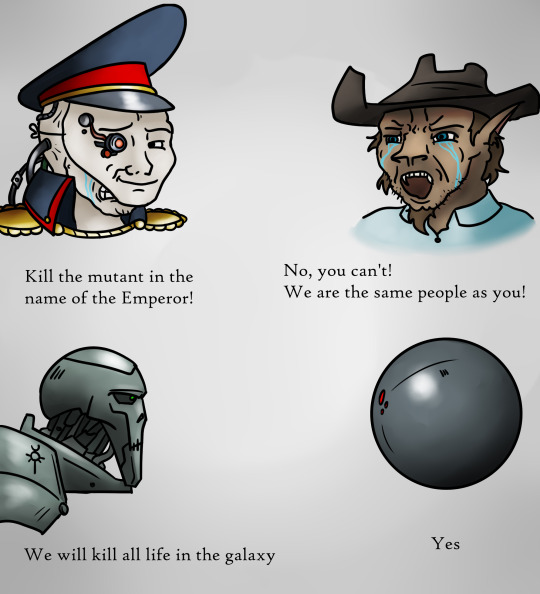
Average day in galaxy
#all tomorrows#posthuman#speculative biology#nemo ramjet#digital fanart#digital#digital art#fanart#killer folk#art#gravitals#necrons#warhammer 40000#wh 40k#40k#meme
370 notes
·
View notes
Text







Eoraptor is a genus of basal sauropodomorph dinosaur, and one of the earliest known dinosaurs to exist, which lived throughout what is now South America during the Carnian stage of the Triassic Period some 231 to 228 mya. The first remains of Eoraptor consisting of a partial articulated skeleton were unearthed in 1991 from the Valle de la Luna and the Cancha de Bochas Member of the Ischigualasto Formation in Argentina, by paleontologist university of San Juan paleontologist Ricardo Martínez, during field work conducted by the University of Chicago and the University of San Juan. The specimen was then shipped to the Field Museum of Natural History in Chicago for preparation by William F. Simpson and Bob Masek. It was then described by Paul Sereno, Catherine Forster, Raymond R. Rogers, and Alfredo M. Monetta in 1993. Who named the animal Eoraptor lunensis meaning dawn plunderer from the Valley of the Moon. Said holotype was later returned to Argentina where it remains on display at the Museum of Natural Sciences. Today three mostly complete Eoraptor remains have been recovered along with other isolated elements such as teeth. Reaching around 3.3 to 5.7ft (1 to 1.7m) in length and 11 to 22lbs (5 to 10 kgs) in weight, eoraptor was quite small and lightly built compared especially compared to its titanic descendants the sauropods. It was a bipedal animal, capable surprising speed and agility, with flexible 5 fingered hands which sported 3 large claws likely used to help capture prey. Combined with its distinctive lightly built skull, these features caused scientists to first assign eoraptor as a theropod. However over time certain skeletal morphologies and its leaf shaped teeth lead it to reclassified as a sauropodomorph. In life eoraptor would have been an omnivore feeding upon ferns, cycads, seeds, horsetails, conifers, insects, fungi, and small vertebrates.
Art Used can be found at the following links:
#eoraptor#sauropod#dinosaur#sauropodomorph#triassic#pleistocene pride#pliestocene pride#mesozoic#Ischigualasto formation
3 notes
·
View notes
Text
All Tomorrows: Vanga-Vangog Stickmen Hc’s
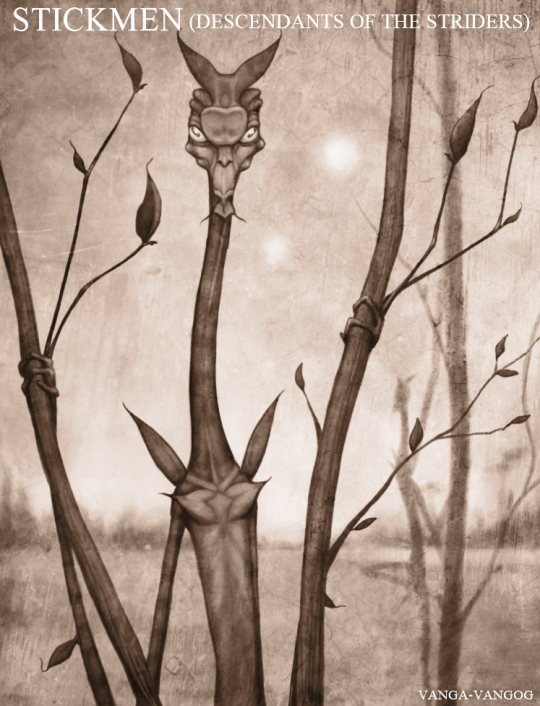
Say hello to Vanga’s Stickmen, the descendants of the infamously tall and frail Strider’s. Unlike in canon where they would all be devoured mercilessly by giant chickens, the Stickmen’s ancestors managed to survive by climbing and living on the giant, skyscraper-like trees of their world.
Although a little less tall than the Stickmen, they are much sturdier due to needing to jumping across different trees and survive falls. They communicated visually via the rapid changing of colors and shapes of their leaf-like growths and sign language, and their culture emphasized coexistence, patience, and pacifism.
As philosophical as the Pterosapien’s yet opposite in their overall message, the Stickmen are one of the most interesting fanmade species I’ve seen yet, and I wish to post my headcanons about them like I did for the others.
-Because of their very low metabolism’s and the wonders of medicine, Stickmen were among the longest-lived posthumans in the second empire, capable of living hundreds if not over a thousand years! Friendships with other, shorter-lived species would last long after death, with the Stickmen befriending their friends children and grandchildren, giving them sagely advice and wisdom or just cheerfully, casually talking to them.
-Because of their arboreal lifestyle and pacifism, the Stickmen did not have the same domestication process as other posthumans. They did not domesticate a wolf equivalent nor any grazing animals, instead domesticating giant, eagle-sized colonial bees for honey and other byproducts, giant pigeon descendants for the harvesting of feathers, infertile eggs, and as message carriers, and even a species of giant, flying pig descendants larger than the Quetzalcoatlus, who were often used to protect these pigeons and bees from any predators. Also domesticated colonial spiders for their webs, which they used to make ropes and clothing.
-Their domesticated plants were also different. They would carefully tend their trees for the harvesting of boulder-sized fruits and tree nuts, grow mushrooms via large, house-sized stacks of logs from trees which naturally passed away, and also grow algae in vast pools of shallow water. Outside of the algae, their foodstuff was bigger due to it having naturally evolved that way.
-Due to their need of visual communication, their clothing was usually light, never covering their heads, shoulders, or forearms. Their clothes would be made from mycelium threads, feathers from their domestic pigeons, and webs from their domesticated spiders. Yes, their shirts were always off-shoulder tops, teachers hate them!
-A running theme for these Hc’s is that they never developed capitalism, and the Stickmen were no different! In fact, most of their goods were handmade, carefully and delicately made over weeks or months to be as high of quality as possible, and gifted to close friends and family. Only absolute necessities such as medication, infrastructure, and purified water would not be homemade, and it would still be a careful process that emphasized the lack of harm to anyone, both their own and other species.
-This included movies and videogames, with practically zero in the way of crunch or abuse. The former of which would last hours if not days, and the latter would often resemble that of animal crossing, a tactical rpg ala Fire Emblem, or literally just Minecraft! No joke, they remade Minecraft on complete accident!
-Their art was primarily that of tattoos and body modifications to distinctive themselves, large-scale land art made from specially grown plants, fungi, stones, or non-toxic paint, meant to be appreciated fully from the top of treetops or skyscrapers, and gardens that allow for peaceful meditation. They had little music however, as sound travelled poorly in their world.
-They are one of the four founding species of the Second empire, along with the Satyriacs, Killer Folk, and Rot Eaters. They were stereotyped as spaced-out, yet extremely wise and peaceful, thought of as the mediators of the other 3 species. This, of course, was a stereotype, one that many Stickmen found a little insulting.
-Because of a culture emphasizing patience and the fact high gravity worlds would kill them, they decided on the extinct Lopsider’s idea of creating an artificial race to colonize the stars. Unlike with the Asymmetric’s however, it wasn’t a rash, cold-hearted process meant to create slaves to do dangerous, dirty work for them, but instead a slow, caring process that would go into the centuries, meant to be sure the Stickmen’s descendant species would have lives much better than their own, not struggle in the colonization of new planets, and modified to be superior in every way outside of height. (A given due to square-cube law) These people would be allowed to live free, independent lives from their parent species, and would pick a name for themselves. This name? The Sproutlings.
#all tomorrows#all tomorrows strider#strider#stickmen#cm kosemen#nemo ramjet#posthuman#headcanons#worldbuilding
83 notes
·
View notes
Note
Hard mode: top 10 spec projects that are at least 10 years old?
AAAAGH…
Okay, um…
1 After Man by Dougal Dixon
2 Man after Man by Dougal Dixon
3 All Tomorrows by Nemo Ramjet
4 the Future is Wild
5 Last and First Men by Olaf Stapledon
6 Expedition by Wayne Barlowe
7 the Snouters: the Form and Life of the Rhinogrades by Gerolf Steiner
8 Greenworld by Dougal Dixon
9 the New Dinosaurs by Dougal Dixon
10 the Flight of Dragons by Peter Dickinson
again, PLEEEEASE don’t rank these for whatever you need them for! But I will say that, though I have read all of these, Greenworld and Last and First Men I have only read bits of so far. Nevertheless, they are all brilliant and I hope you find them to your liking!
PS Expedition is particularly good, but it is also rather expensive to find these days. It is well worth the price though!
3 notes
·
View notes
Text
you know what screw it im not scared!!!

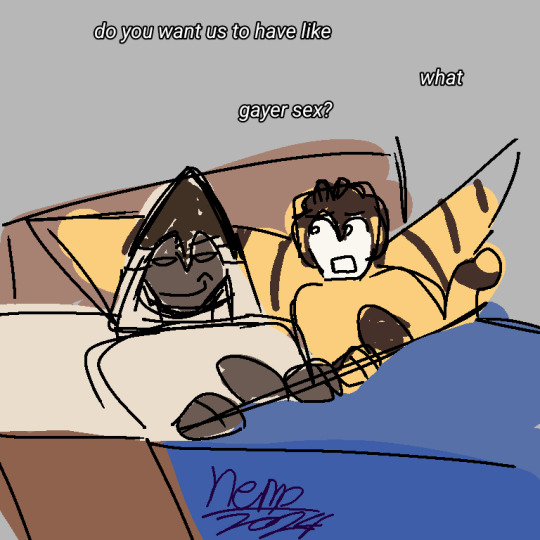
RAMSTORM MY BELOVEDS!!!! they're so silly to me :33333
#ramstorm#(sex is mentioned but there's notjing going on thehre judt in bed together!!!)#ramjet#sunstorm#tfa ramjet#tfa sunstorm#tfa#transformers#maccadams#maccadam#i love them#and i WILL give them more personality than just being Singular Starscream Traits#BECAUSE I LOVE TJEM#AND I LOVE THEEMEMEMEMEME SOOSOSO KCUCHHH#wnd thehre in love#suggestive humor#nemo art!
63 notes
·
View notes